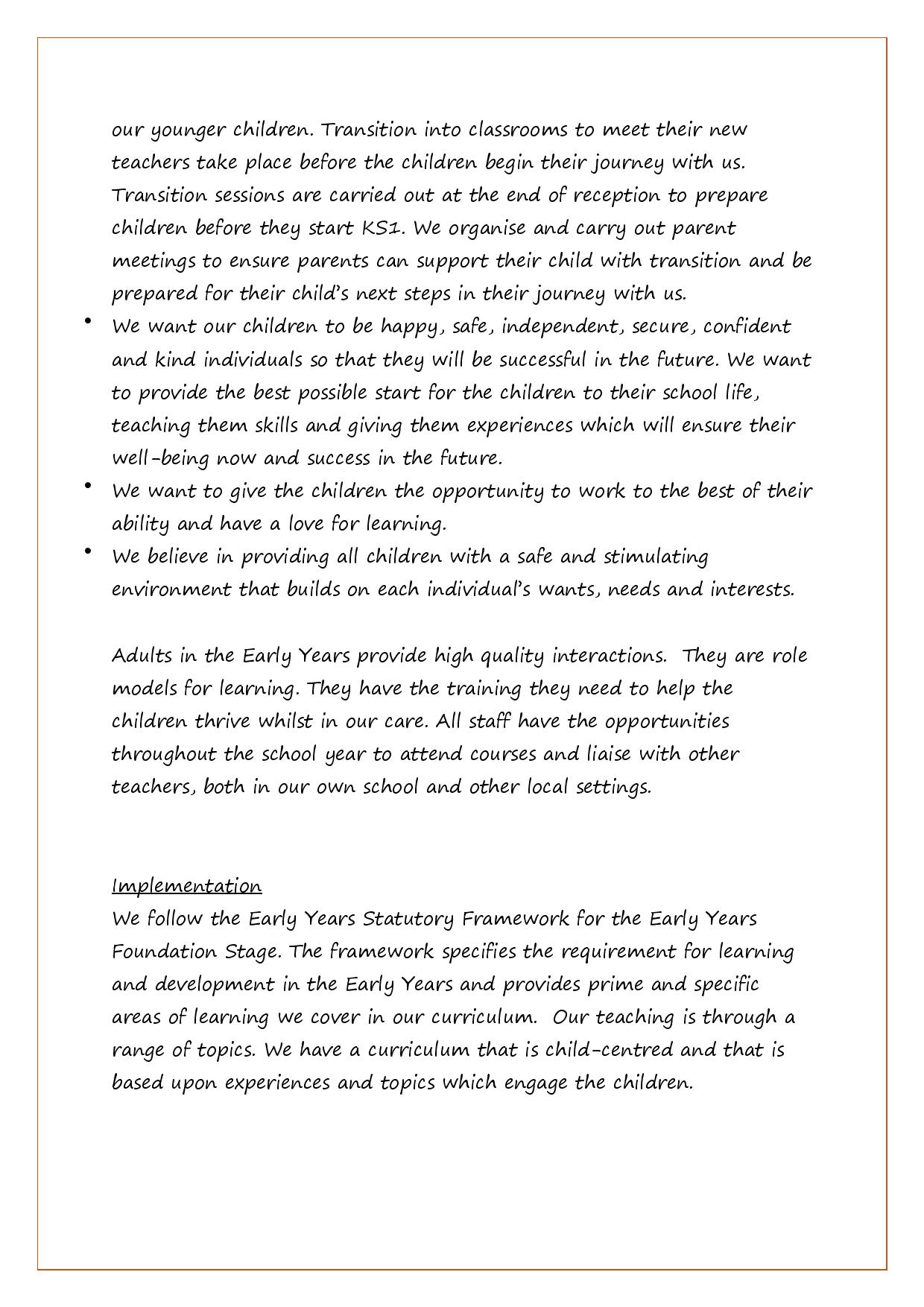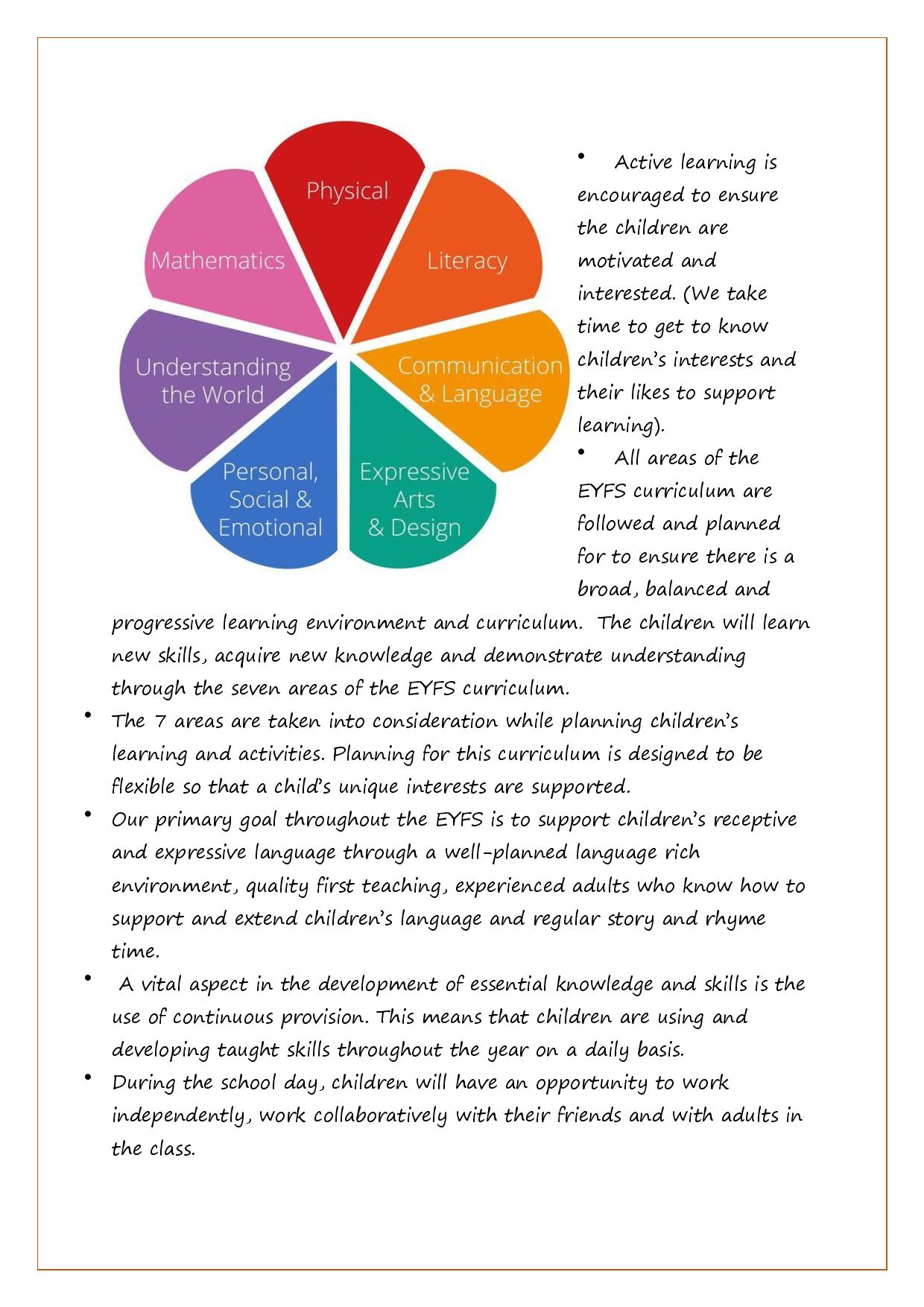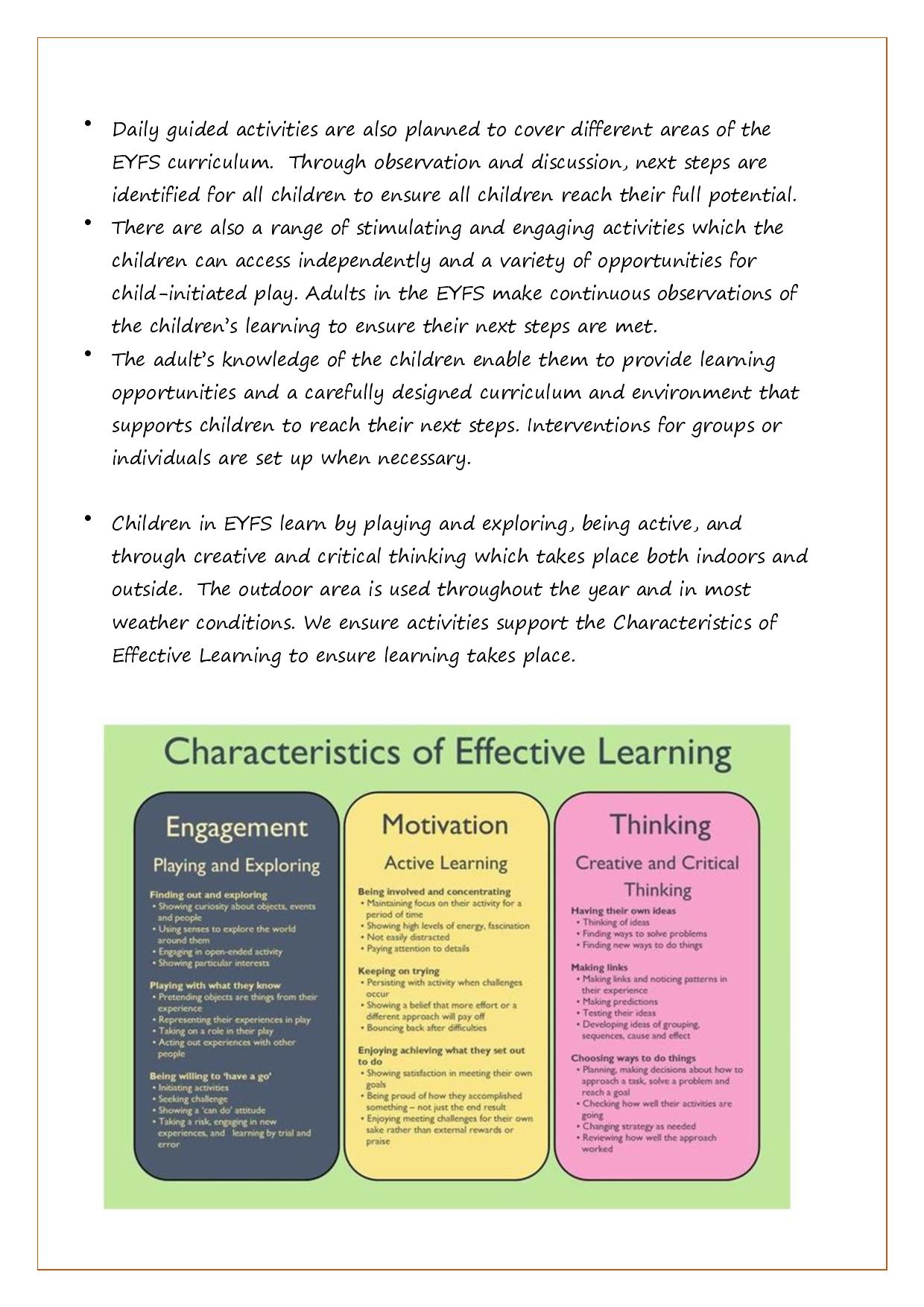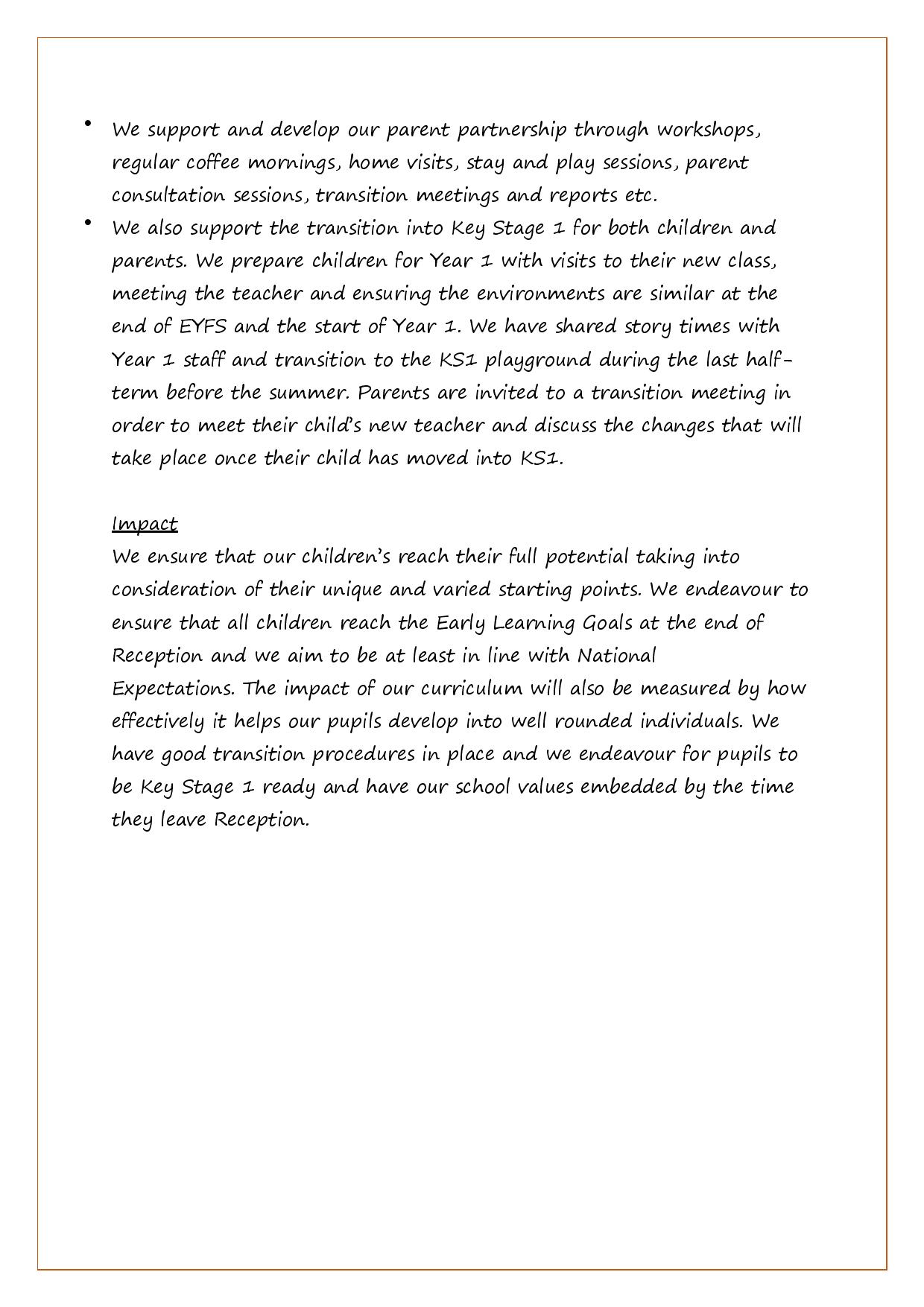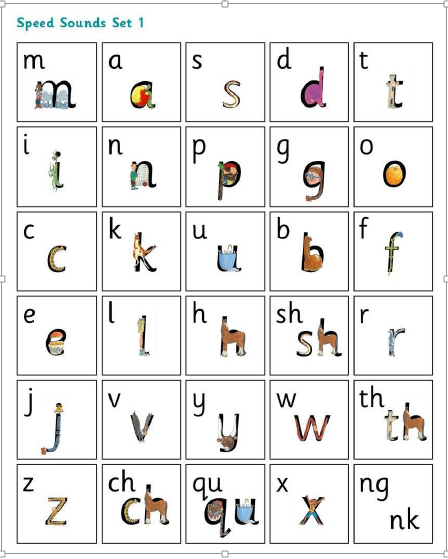‘Be The Best You Can Be’
Welcome to The Early Years Foundation Stage at The Ellis
We are very proud to have an Early Years Foundation Stage Unit which provides high quality care and education for children aged between 3 and 5 years. The early years consists of Foundation 1 (also known as F1 or Nursery) and Foundation 2 (also known as F2 or Reception). The classes are led by experienced, qualified Early Years teachers (Mrs Pollard F1 and Mr Grayhurst F2) and was graded Good by Ofsted in 2022.
Our Early Years Rationale:
Every child deserves the best start in life and the support that enables them to fulfil their potential. Children develop quickly in the early years and a child’s experiences between birth and five have a major impact on their future life chances. A safe, secure and happy childhood is important in its own right. Good parenting and high quality early learning together provides the foundation children need to make the most of their abilities and talents as they grow up.
Cultural capital is the essential knowledge that children need to prepare them for their future success. As part of their entitlement, we acknowledge that each child arrives to our setting with a number of experiences and ideas based on their own personal circumstances and as Early Years Practitioners, we ensure this is reflected in our practice and provision.
Classes
In Nursery, we offer 26 places in the morning and the afternoon for 3-4 year olds which can be either full-time or part-time. This is on a flexible basis according to the needs of our parents and children.
Nursery sessions consist of:-
- three hour morning session (8.45am-11.45am)
- three hour afternoon sessions (12.30pm-3.30pm)
- full-time sessions (8.45am-3.30pm)
To find out if your child is eligible for a full-time place go to:
https://www.gov.uk/apply-30-hours-free-childcare
Please ensure that you contact school to find out more advice regarding availability.
Please note that your acceptance into Nursery does not automatically mean that your child will be admitted in our Reception class. There is a separate application process.
Nursery environment photographs
Reception environment photographs
In Reception we offer 30 full-time places to 4-5 year olds (depending on your child’s date of birth)
Reception sessions start at 8.50am-3.20pm.
Please remember that you will need to apply for a school place for you child in our Reception class. For more information on applying for a school entry place, please go to:
Welcome to Reception Pupil Booklet 2025
Transition
Before your child starts Nursery or Reception we carry out transition meetings.
Home visits are made to new children to offer opportunities for parents to speak to staff about their child.
Nursery children and their parents are invited to Ready Steady Play sessions in school in order for children to meet their new class teacher and visit their learning environment.
All children are invited to spend time in their new class before they are due to begin Nursery or Reception.
Both Mrs Pollard and Mr Grayhurst also run transition meetings* within the setting for all parents prior to their child starting at The Ellis.
*More in depth details about your child’s transitions will be given at these meetings.
The Starting Reception guide provides parents with essential information and practical tips to help their children transition smoothly into reception. It covers key topics such as preparing for the first day, understanding the reception curriculum, and fostering a positive learning environment at home.
Curriculum
In both Nursery and Reception your child will be learning through the Early Years Foundations Stage (EYFS) Curriculum. They will acquire new skills and knowledge and demonstrate their understanding through 7 areas of learning and development.
The first 3 are described as prime areas, these are:
- Communication and language;
- Physical development; and
- Personal, social and emotional development.
These prime areas are those most essential for your child’s healthy development and future learning.
As children grow, the prime areas will help them to develop skills in 4 specific areas.
These are:
- Literacy;
- Mathematics;
- Understanding the world; and
- Expressive arts and design.
These 7 areas are used to plan your child’s learning and activities. The teachers and teaching assistants supporting your child will make sure that the activities are suited to your child’s unique needs and extend their learning.
Your children will learn by playing and exploring, being active, and through creative and critical thinking which takes place both indoors and outside.
Language is a key aspect and is crucial to all areas of learning and development throughout and EYFS and school.
To find out more about the Early Years Foundation Stage Curriculum please go to the link below:
EYFS Statutory Framework January 2024
Characteristics of Effective Learning
Our early years curriculum offers a play based approach to learning. How your child learns is outlined through the Characteristics of Effective Learning which is documented in the Statutory Framework for The Early Years Foundation Stage (EYFS)
There are 3 characteristics of effective learning:
Playing and exploring – engagement
- Finding out and exploring
- Playing with what they know
- Being willing to have a go
Characteristics–of-Effective-Learning-1
Active learning – motivation
- Being involved and concentrating
- Keeping trying
- Enjoying achieving what they set out to do
Characteristics-Effective-ofLearning-2
Creating and thinking – critically thinking
- Having their own ideas
- Making links
- Choosing to do things
Characteristics-of-Effective-Learning-3
Supporting Children’s Language in the Early Years
Language development is an essential aspect within all areas of learning. For this reason teachers prioritise this as a key area for development. The early years teachers provide a language rich environment where children are constantly hearing, developing and using new words to communicate.
Throughout Nursery and Reception all children will constantly develop their communication and language skill with key focus on listening and responding appropriately.
On entry to our Nursery, children’s speech and language skills are assessed and referrals to Speech and Language are carried out if required with parental consent. Children will be supported in class through one-to-one or small group sessions with a focus on pronunciation skills.
WellComm is a Toolkit to help teachers to identify children who may need extra help with their Speech, Language and Communication Development.
Every child is assessed for around 10 15 minutes on their understanding of what is being said to them (their “receptive” language) and also how they communicate verbally (their “expressive” language).
Elklan is a language development approach which supports children speech and communication skills. Staff use the assessment tools to identify particular needs and support them accordingly.
Nuffield Early Language Intervention is a programme used to support children’s receptive and expressive language during the Reception Year. Staff use a language screening tool to identify children’s individual needs and next steps. Children access supporting activities in small groups with an adult.
Pre-Phonics Development
On entry to Nursery, Mrs Pollard concentrates on developing children’s speaking and listening skills and lays the foundations for the phonic work (breaking words down into individual sounds which in turn helps children to read and write). The emphasis during this stage is to get children attuned to the sounds around them and ready to begin developing oral blending and segmenting skills (e.g. c-a-t =cat)
During this stage the children focus on three essential strands:
- Tuning into sounds (auditory discrimination= is the ability to recognise differences between sounds)
- Listening and remembering sounds (auditory memory and sequencing= the ability to remember spoken sequences such as numbers, words and sentences)
- Talking about sounds (developing vocabulary and language comprehension).
As soon as the children enter our Early Years Nursery and Reception they are exposed to regular story times, learning new songs, rhymes and poems. All this has a direct impact on the essential skills children need to become fluent readers and writers.
Read Write Inc
Read Write Inc (RWI) is a programme which helps all children learn to read fluently and at speed so they can focus on developing their skills in comprehension, vocabulary and spelling. The programme is designed for children aged 4-7.
On entry to Reception, Mr Grayhurst will carry out a Read Write Inc. assessment to identify children current knowledge of letter and sounds and determine next steps in the children’s phonic development. The children then access small group phonic session with both Mr Grayhurst and Mrs Beevers (EYFS Teaching Assistant). To begin with children will learn the Set 1 sounds. Please see below:
The children then progress on to learning the following vowel digraphs (2 letters 1 sound) and trigraphs (3 letters 1 sound). Please see below:
Children will also learn how to orally blend and segment to support their reading, write individual letters and CVC words (3 letter words e.g. cat) and begin to use all of this knowledge to read and write simple sentences.
Parent Partnership
Developing a good partnership with parents is one of our key aims in ensuring children have the best start in life. Whenever possible, staff will be available to answer parent questions or deal with any concerns that may arise.
As part of our parent partnership we promote home learning within a realistic context as we recognise the important role parents have in educating their child.
All children will bring home a library book each week to share at home. Parents are encouraged to complete reading diaries and journal and return them back to class each week. Children will also bring home learning diaries to fill in and return on completion. Children in Reception will also bring home high frequency words to learn to read by sight and a phonic and book banded reading book.
Parents are invited to Parents Evening to discuss their children’s education with the class teacher.
Reports are also sent home towards the end of the year.
Foundation Stage Workshops
Mrs Pollard and Mr Grayhurst are committed to forging positive and effective partnerships with parents to provide children with the best possible start to their education. Throughout the year they provide several workshops for parents/ carers/ grandparents etc. to improve their confidence and ability to support their child’s learning and development. These workshops are provided as a high proportion of children enter school with noticeably below skills in language and literacy.
The workshops therefore cover:
- The curriculum- What to expect in the Early Years
See the full document here…
What to expect in the Early Years
- Reading in the Early Years
- Language through stories
- Writing
*more information will be given and invitations sent home throughout the year
PPA and cover Staff
PPA time is Planning, Preparation and Assessment. Mrs Pollard and Mr Grayhurst take this opportunity to prepare exciting learning opportunities for all children in the Early Years. It also gives them time to ensure that provision meets the children’s needs. While the teachers are taking their PPA time, the classes are managed by skilled and experienced Early Years support staff.
Progression of key skills throughout the EYFS – Why do we plan the curriculum the way we do?
Our curriculum goals have been designed with the aim of supporting children’s learning and development so that they are ready to be successful learners by the end of the EYFS. Each curriculum goal in the prime and specific areas of learning are broken down into milestones for Nursery and Reception to ensure that there is a clear sequence to learning and development in our curriculum so that staff are aware of all children’s next step in their learning. The incremental steps also ensure that all staff are aware of the end goals which supports making accurate judgements at key assessment points (baseline, autumn, spring & summer).
Our intention is to help inform parents of where children are in their learning and development so that they are able to support their children in their next steps.
Mrs Pollard and Mr Grayhurst use this as a working document to ensure that there is a clear learning trajectory for the children within our Early Years.
These curriculum goals will also aid the Year 1 teacher when they are transitioning the children into KS1.
The Ellis EYFS Goals Holistic Document
Long Term Plan
Our Early Years Long Term Plan has been carefully designed to ensure that we are offering a range of appropriate child-centred topics that cater for the needs and interests of our children. The topics have also been created with the Early Years Curriculum in mind so that key concepts and skills are embedded to provide a broad and balanced curriculum. The two year cycle ensures that there is full coverage of the EYFS curriculum.
Foundation-Stage-Long-Term-Planning Revised 2025
Medium Term Planning
Mr Grayhurst and Mrs Pollard have worked collaboratively to produce comprehensive Medium Term Plans that map out a progression of the key knowledge and skills that children need to acquire and develop during their time in the Early Years. However, the EYFS Team have a flexible approach to ensure that they respond to children’s immediate interests and strengths.
Nursery Progression of Skills & Curriculum Overview
Reception Progression of Skills & Curriculum Overview
Overview Key Texts for Early Years
EYFS Key Text and Language Rich Curriculum Planning
Class Newsletters
In order inform parents about topics, work and activities that we carry out in our Early Years Unit, regular newsletters are sent out to support our communication with parents. These newsletters also offer information on how to support your child at home.
Nursery Newsletter January 2025
Reception Newsletter January 2025
Reception Newsletter March 2025
Reception Newsletter June 2025
Nursery Newsletter September 2025
Reception Newsletter September 2025
Nursery Newsletter January 2026
Reception Newsletter January 2026
Class Dojo for EYFS
When your child joins us at The Ellis, you will be invited to join our School’s Dojo, where each class has their own webpage where you will be updated about key events and ongoing learning and activities in school.
School Facebook page
Our school Facebook page is also a good way for our parents to keep in touch with the latest developments in school.
https://www.facebook.com/TheEllisCESchool/
Seesaw
Our Foundation Classes use the learning platform Seesaw to provide some home-learning activities and share information with parents.
50 Things to do before you are 5
‘50 Things to do’ aims to provide inspiration for parents and carers to connect with children through a range of activities including a wide range of low cost or no cost activities which supports and enhances early language, literacy, motor skills and resilience.
50 things to do before you are 5
Million Word Gap
This was recent study that highlighted the importance of reading stories to young children as regularly as possible. Children who are read to on a regularly basis have heard approximately 1.4 million more words than children who are never read to. The words children hear in books are more complex, difficult words than those heard in conversations at home. For more information please access the document below.













